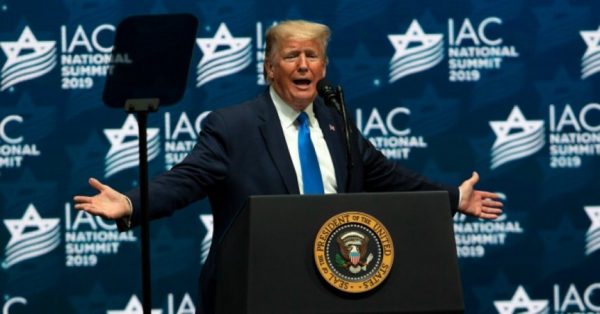
Anti-Semitism is pernicious and dangerous wherever it appears, including on college campuses. It’s appropriate for the federal government to investigate and if necessary penalize federally aided colleges and universities that fail to protect Jewish students from harassment or discrimination.
But an executive order signed by President Trump on Wednesday, supposedly to further that goal, includes language that is far too broad and could end up undermining free speech on campus, a cause to which the president also has committed his administration.
We have no quarrel with the thrust of Trump’s executive order, which is that the federal government should make use of Title VI of the Civil Rights Act to monitor anti-Semitic incidents on college campuses.
Title VI explicitly prohibits discrimination on the basis of “race, color or national origin” in programs that receive federal funding, but it doesn’t mention religion. Nevertheless, the federal government has interpreted Title VI as empowering it to investigate discrimination against members of groups that can be defined by religion as well as ethnicity. As the Department of Education’s Office of Civil Rights notes on its website: “Hindu, Jewish, Muslim, and Sikh students are examples of individuals who may be harassed for being viewed as part of a group that exhibits both ethnic and religious characteristics.”
So there is nothing sinister about Trump suggesting that Title VI can be used to investigate acts of anti-Semitism on college campuses. But his order is troubling for a different reason. It directs federal agencies in monitoring discrimination on college campuses to “consider” a definition of anti-Semitism adopted by the International Holocaust Remembrance Alliance.
That statement, which also has been endorsed by the U.S. State Department, accurately defines anti-Semitism as “a hatred toward Jews.” But then it provides “contemporary examples of anti-Semitism” — also mentioned by the White House — that blur the distinction between hatred of Jews and criticism of the State of Israel. It includes as examples of anti-Semitism: “Denying the Jewish people their right to self-determination, e.g., by claiming that the existence of a State of Israel is a racist endeavor” and “Applying double standards by requiring of [Israel] a behavior not expected or demanded of any other democratic nation.”
Harsh criticism of Israel — even if it involves questioning the existence of a Jewish state — is speech protected by the 1st Amendment. It should also be permitted by private colleges that receive federal funds. Students have a right to be protected from harassment and discrimination, but they don’t need to be shielded from opinions they find objectionable or offensive.
Earlier this year, Trump issued an executive order designed to protect free speech on college campuses. In remarks at the time, the president said: “Universities that want taxpayer dollars should promote free speech, not silence free speech.” If Trump were serious about protecting free speech on campus, he wouldn’t be signing a directive that could be used to undermine that right.
LOS ANGELES TIMES

Leave a Reply
You must be logged in to post a comment.